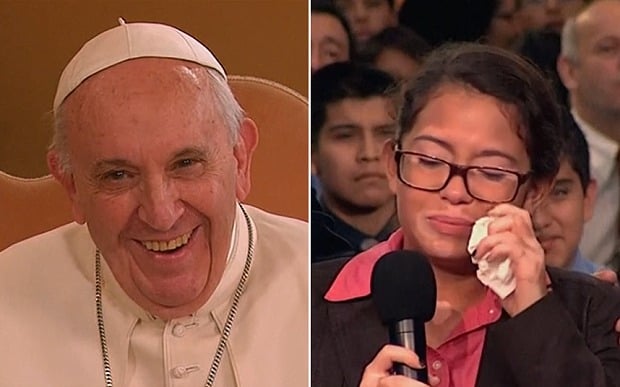I don’t know Valerie Herrera. I’ve never met her. I am not Latina. I don’t live in Chicago. I don’t have a rare skin condition. I was not bullied in school. I do not have a beautiful singing voice.
But when this video of Valerie meeting Pope Francis went viral last week I wanted to inject myself in their conversation —
Who are you, Valerie?
What does it feel like to be you?
Can you help me learn how to be courageous?
* * *
A few days after Valerie became Youtube famous, ABC’s 20/20 produced a hour long program of Pope Francis meeting virtually with three different groups: parishioners from Sacred Heart Church in McAllen, Texas, people experiencing homelessness in Los Angeles, and high school students from Cristo Rey Jesuit High School in Chicago.
According to an ABC report, Francis chose these sites personally. This might be a surprise for those who haven’t followed him closely over the last 2+ years, but those who have know by now the kinds of people Francis surrounds himself with: the homeless, the immigrant, and the young.
All three groups have experienced life at the margins of society, and Francis is particularly interested in people in this position. He ministers to them. He listens to them. He advocates for them. He tells us we have something to learn from them.
The conversations between Francis and his American interlocutors were profoundly moving, demonstrating Francis’ deep understanding of the issues that face the contemporary Church in the United States. (Even the back and forth between English and Spanish felt natural. The face of the Church is becoming more Latino, so why not speak to as many possible?)
Yet it was not Francis’ remarkable grasp of key issues or visionary thinking that impressed me most. Instead, it was his capacity for encounter. Especially his encounter with Valerie Herrera:
The exchange between Francis and Valerie prompted me to keep a running diary (times listed correspond with the video above):
7:45 – Valerie begins talking to Francis. Right away I can tell she handles the mic like a pro. This is a confident and mature young lady, I think as she tells her story, not only to Francis, but to the whole world.
8:09 – I start to shift in my seat as Valerie gets emotional. I never know what to do when someone gets emotional in a public place. But I know what I feel: awkward. I look at the floor or pretend to look deeply at a nearby paper or magazine. Anything that will help the awkwardness pass.
8:14 – The reporter hands her a tissue. Good move, I think. Get this over. The next twelve seconds feel like twelve minutes. As I watch and wait, I find myself imagining what I would be thinking if I were crying in front of the whole world, oh yeah, and the Pope:
This is going horribly wrong…
He is just looking at me – I don’t know what to say!
Now I’m crying in front of EVERYONE.
This is so embarrassing!
Looking at Valerie I’m convinced she’s feeling something like this too.
8:26 – She begins to formulate her question for Francis. Her words are choppy, and I strain to piece together the different parts of her narrative.
Bullying. Tears. Hurt?
Music. Family. Redemption?
8:38 – As Valerie pushes through her story, my attention turns to Francis. His eyes are locked on her. He doesn’t search for the nearest magazine or study the ground. He is listening to her, awkwardness be damned.
9:04: With cracked voice and residue of tears resting on her cheeks she asks, “What are you expecting from us, the youth? What are you expecting us to do? To be?”
9:20 – Francis doesn’t answer, instead he asks a question of his own: “Valerie, I would like to hear you singing. May I ask of you to sing a song for me?”
With Valerie, my mood lightens. The awkwardness lifts from my chest and I exhale. But then my pulse quickens again and, as I watch Valerie’s face the thoughts come racing:
What? But I didn’t even prepare a song!
What if my voice cracks?
Does he really want to hear me sing?
This is CRAZY!
9:41 – The audience applauds. Valerie hesitates:
Do I really want to risk this?
Am I really good enough to sing for the Pope?
Are they just being nice to me?
10:10 – Valerie looks back into the crowd, finding her mom’s face. Valerie’s mom, hands gesturing in support, encourages her. So does Francis, some rare English words coming through his thick accent: “Be cour-ay-geous!”
And Valerie sings.
* * *
There were lots of tears in McAllen, Los Angeles, and Chicago during those interviews.
Tears of shame, like when Rosemary and her daughters Celeste and Alyssa shared what it was like to experience homelessness. Tears of joy, like when Sister Norma was unexpectedly recognized by Francis for her powerful example of love to migrants crossing the U.S./Mexico border. Tears of suffering, when Ricardo shared the pain of being refused entry into college because he didn’t have U.S. citizenship, having moved to the United States at the age of four. Francis didn’t show any signs of awkwardness at the sight of these tears. Instead, he listened. As they shared their experiences, he remained silent. Yet his gaze spoke volumes:
It’s okay that you were bullied. You are worth my time.
It’s okay that you’ve made mistakes. You should be proud that you have the strength to be a single mom.
It’s okay that you left school before you wanted to. Your experience of providing for a family will prepare you for having a family of your own.
I know we have not always appreciated you and what religious sisters have meant to our world. But take heart, we love you!
Francis did not solve Valerie’s problem of being bullied. He didn’t offer Rosemary a deep reflection about the roots of systemic homelessness. He didn’t explain to Sr. Norma the rationale behind the Vatican’s treatment of religious sisters in the United States.
There are a million things he didn’t do. But he did do three things: He listened. He pastored. And, with Valerie in particular, he helped her to be courageous. He helped her share her God-given gift with the world, and in sharing it, she was able to recognize her own worth.
* * *
I think that resisting awkwardness is the first step toward being more courageous. Most days a simple examen reveals to me at least one instance where I’ve resisted an opportunity for a graced encounter because I hate feeling awkward.
Like when the guy on the subway gets up and reveals he is experiencing homelessness and needs some change – really, anything will help – to feed his family. I cast down my eyes to the ground, pretend to check the phone that almost never has service underground. Why? Because It’s awkward to look him in the eye. Awkward to tell him I have no change, or even worse, that I just don’t feel like giving him any.
Or when I have a conflict with a member in my community on small daily things, like dishes left undone or toilets insufficiently cleaned. My mind flashes to many possible scenarios:
What if a fight erupts?
What if talking to him leads to a laundry list of my own faults and imperfections?
What if it hurts him?
Having a conversation that even remotely resembles conflict is awkward, so I avoid it. It’s just safer that way.
In my imagination, Francis felt every bit as awkward as I did when Valerie began to cry. However, perhaps he also recognized her tears as an opportunity for a graced encounter. Rather than casting his eyes down or waiting for the awkwardness to pass, he continued to look her in the eye. Maybe he said a prayer for her as he did so.
By keeping his attention focused on Valerie and her situation rather than on his own experience of awkwardness, Francis was able to offer her the opportunity to shine.
I pray that God will give me that kind of awareness and courage in those moments when awkwardness strikes.
* * *
It is clear that Valerie Herrera is a courageous young woman. She had the courage to say “yes” when her principal and teachers invited her to speak to the Pope. She had the courage to be vulnerable in sharing the hurt of being bullied. She had the courage to risk embarrassment and failure by singing in front of millions.
I wonder where Valerie got this kind of courage.
Maybe it was from her mother. I was touched when Valerie’s initial response was to look to her mom after Francis asked her to sing. Her mother’s smile and hand gesture gave Valerie confidence that, yes, she could sing for the Pope. Who knows how many times she has offered that gesture to encourage Valerie. When she was learning to walk and talk. As she took that first step into her kindergarten classroom. On her first day on the job at her Cristo Rey work assignment.
Maybe it was from the community. There were surely many others in that chapel who helped form Valerie into a courageous young woman: Teachers who helped her see her gifts and talents, classmates who stood up for her while she was being bullied, family and neighbors who celebrated her birthdays, and comforted her during her struggles.
Or maybe it was the look on Francis’ face. The intensity of his eyes, the lift in his voice, the roll in his “R’s” as he said “Be cour-ay-geous!” Francis said volumes with those two words. With them, through Valerie, he told all of us Americans to be courageous. With them he validated our mother’s smiles of support. With them he reminded us that courage is a communal trait.
But it’s not the last thing Francis said to Valerie. After she moved us with her rendition of “Junto a ti, Maria,” he offered words of prayerful advice:
“What I hope for youth is for you to not walk alone in life… that you feel encouraged to walk with the love and the tenderness of others. Life is difficult. It is difficult to walk alone. You get lost. You get confused. You can stop because you get tired of walking. Each young person needs someone in life to help them along the path…. First, walk with company. Second, I hope that young people walk with courage.”
Last week, Sister Norma in McAllen, Rosemary in Los Angeles, and (especially) Valerie in Chicago helped me to see what he meant when he asked us to walk with courage. To be cour-ay-geous.


